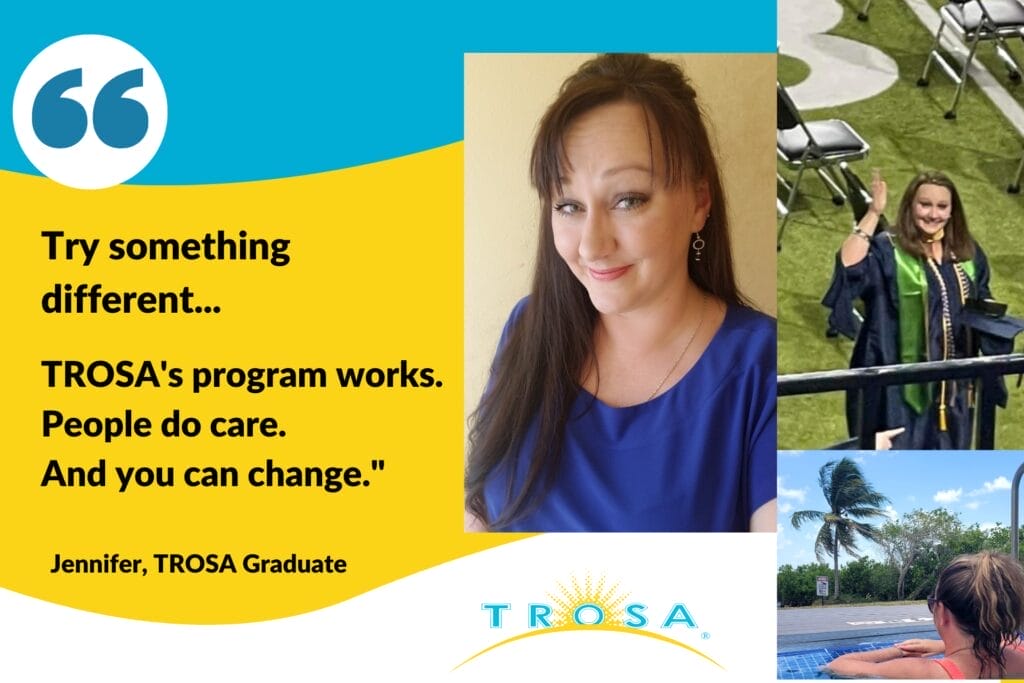“Try something different. Change is possible; but it doesn’t happen all at once.”
After 10 years in active addiction, TROSA graduate Jennifer decided it was, indeed, time to try something different.
Today, Jennifer holds a Master of Social Work (MSW) degree and proudly serves her home community, working with children and their families as an outpatient clinician. When asked what she would want people to know about TROSA, she shares: “The program does work. People do care. And you can change.”
Jennifer grew up in a small town near Asheville, North Carolina. After multiple stays in shorter-term programs, she learned about TROSA. “I had been in and out of detoxes and rehabs probably 10, 15, 20 times before TROSA,” Jennifer shares. “Finally someone at my last detox asked me if I had ever heard of TROSA.”
When she learned that TROSA’s program was two years-long, Jennifer was initially wary of the length of time. “I didn’t think I could be anywhere for two years,” she shares. Her children and a need to feel safe and secure were Jennifer’s biggest motivators for giving recovery at TROSA a chance. She started TROSA’s treatment program on January 13, 2012.
While participating in TROSA’s long-term residential recovery program Jennifer learned to build relationships; participated in individual therapies; and took parenting classes.
Jennifer gained practice in expressing her emotions in a healthy way. “I learned a lot about communication–how to give and receive feedback. I learned how to advocate for myself and for my needs. I also learned that nobody’s perfect, stuff happens, and it’s never too late to make a change in your life.”
She gained the experience and mentorship of fellow residents and staff members. Most of TROSA’s staff are in recovery themselves; many of them are graduates of TROSA.
“Sandie Alger [TROSA Women’s Program Senior Advisor] made the biggest impression on me. She didn’t remind me of things that I did do; she told me all the things that I could do.” And Jennifer credits TROSA Women’s Program staff member Cathlene Cole as being instrumental in learning about the courage and strength it takes to put up boundaries.
As part of a full comprehensive range of activities and services, TROSA residents participate in community assignments that play a key therapeutic role in their program. Within community assignments, residents identify behaviors they may want to change and practice making those changes as part of a team. Residents learn new life skills and talents and have the opportunity to practice living in recovery with others.
Jennifer’s community assignments included TROSA’s Food Service, Transportation, and Medical departments. While in TROSA’s Medical department Jennifer realized the long-term health ramifications of addiction, seeing firsthand the health needs that individuals in addiction experienced.
After graduating from TROSA in 2014, Jennifer took advantage of our post-program graduate services, including transitional housing for graduates.
“I had a really good job when I left TROSA–I was able to save a lot of money as a manager of a restaurant and I could even send money to my family. I lived in TROSA graduate transitional housing for about a year and then I went out on my own and got my own housing.”
On Mother’s Day, Jennifer surprised and delighted her mom by moving back to her hometown. “I wanted to make sure I was really ready and could make that commitment to recovery before I moved back home.”
Jennifer found work at a crisis center and enrolled in a two-year college, where she earned a degree in Human Services. She then received a Bachelor of Social Work degree from Western Carolina University; and then earned a Master of Social Work degree from East Tennessee State University and became an MSWA. She got married and found her dream job.
“I’m an outpatient clinician working with children. I have a really big office with really big windows, and I’m grateful for every day of it. I serve children from 4 – 17 years of age who have an array of diagnoses.”
Jennifer loves working with children: “It’s always an adventure! There’s never a dull day and they bring joy into my life.
“I often have to do comprehensive clinical assessments–biopsychosocial assessments–before clients start therapy, and we make a treatment plan and set goals. I make sure we’re always working towards our goal and adjust our goals as needed.”
Jennifer helps the children she serves to learn and practice skills for dealing with life’s ups and downs. “I’m big on teaching children mindfulness and teaching them how they can learn to control their emotions.”
Jennifer learned her own valuable skills while in TROSA’s program.
“One of the most valuable skills I learned at TROSA is to be able to say ‘ok’ and know that what other people say doesn’t have to affect me unless I let it. That is one of the most powerful tools I’ve walked away with.
“I also found my best friend at TROSA. We talk every day!”
When asked to share what she would recommend to individuals in addiction, Jennifer says:
“Try something different. Change is possible; but it doesn’t happen all at once. TROSA is designed the way it is for a reason. If you’re willing to accept change and take a step back and let others help you–chances are you’ll succeed.”

